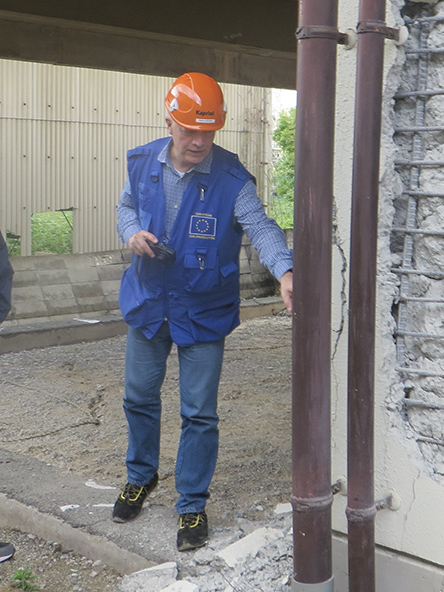Welcome to PaoloNegro.net
structural engineer
scientist
policy analyst
Paolo Negro has been a research officer/project leader at the Joint Research Centre of the European Commission, in the Unit Safety and Security of Buildings, European Laboratory for Structural Assessment (ELSA).

Paolo Negro has a long experience and record of research activity in earthquake engineering and environmental design of buildings.
He holds a Master of Science in Earthquake Engineering from the University of California at Berkeley and a PhD in Civil Engineering from the University of Wales at Swansea.
Prior to working for the European Commission, Paolo was a structural engineer and performed the design of civil and industrial buildings, with precast and prestressed elements, also with innovative solutions, mostly in seismic areas.
As a consulting engineer, he contributed to the design of a nuclear and a thermal power plant and of maritime terminals as well as to the project for the reconstruction of two cathedrals destroyed by the Friuli Earthquake.


Paolo Negro
Paolo Negro has been leading many research projects at the European Laboratory for Structural Assessment, mostly involving large scale seismic testing of structures.
He is serving as liaison member in the Technical Committee ISO TC71, Concrete, Reinforced Concrete and Prestressed Concrete, chairing two subcommittee in charge of drafting new standards, and in the Technical Committee TC13, Seismic Design, of the European Convention for Constructional Steelwork.
He has been representing the Joint Research Centre in the COST Action C25, Sustainability of Constructions, and is currently leading the JRC Action SAFESUST, Impact of sustainability and energy efficiency requirements on building design and retrofit and a preparatory action in support of the New European Bauhaus initiative.
Most recent research projects
structural engineer
Pilot Project “Integrated techniques for the seismic strengthening and energy efficiency of existing buildings”, under mandate of the European Parliament”
Responsible for Action 1, “Overview and classification of technologies for seismic strengthening and energy/environmental upgrading of existing buildings” and Action 3, “Methodologies for assessing the combined effect of upgrading”.
Preparatory Action “New European Bauhaus Knowledge Management Platform”, under mandate of the European Parliament
Responsibility for the project
Building Sustainability
In practice, building sustainability means living in harmony with the natural environment, considering the social, environmental and economic aspects of decisions, and reducing our footprint through a less energy, water and material intensive lifestyle.
Sustainable Structural
Sustainable structural engineering is a practice that requires structural engineers, just like any other profession in any other industry, to minimize environmental pollution. Sustainable structural engineering practices include: Minimizing the incorporated energy in construction materials. Minimizing on-site waste.
Performance Based Design
Performance-based design is founded on the premise that structural systems must meet specific performance objectives. Specific performance expectations are set for the completed design, and processes are prescribed in minimal terms.
Earthquake Engineering
Earthquake engineering is an interdisciplinary branch of engineering that designs and analyzes structures, such as buildings and bridges, with earthquakes in mind. Its overall goal is to make such structures more resistant to earthquakes.
Most recent invited lectures and seminars
Concrete Europe, Concrete Dialogue 2015: Citizens at the heart of the sustainably-built environment
Brussels, November 19, 2015
Invited presentation
Building design for safety and sustainability
fib symposium: Sustainable Concrete: Materials and Structures
Malta, April 10, 2018
invited presentation
Matching safety and sustainability: The SAFESUST approach
Alessio Caverzan Marco Lamperti and Paolo Negro
Building Engineering Forum
Sofia, October 20-21, 2021
Invited lecture
The challenge of integrated seismic and energy upgrading of existing buildings
The Ninth Kwang-Hua Forum: Innovations and Implementations in Earthquake Engineering Research on Engineering Resilience
Shanghai, China, December 10-12, 2021
Invited presentation Combined Seismic and Environmental Renovation of Existing Buildings and the New European Bauhaus Initiative
Chamber of Engineers of Slovenia, Engineers’ day: Renovation of buildings and infrastructures
Ljubljana, March 4, 2022
Invited lecture
The New European Bauhaus initiative and the seismic and environmental rehabilitation of buildings
Aristotle University of Thessaloniki
Thessaloniki, May 5, 2022
Invited lecture
Strategies for the combined improvement of seismic safety and environmental performance of the existing European building heritage
Third European Conference on Earthquake Engineering and Seismology (3ECEES)
Bucharest, September 4-9 2022,
Invited theme lecture
The Challenge of the Integrated Seismic Strengthening and Environmental Upgrading of Existing Buildings, Paolo Negro and Elvira Romano
Convegno Green building e obiettivi di sviluppo sostenibile: dal green washing alla sostenibilita’ allargata
Politecnico di Milano, September 28, 2022
Invited lecture “Punto di vista Europeo”, Progetto pilota di riqualificazione integrate: adeguamento combinato delle prestazioni energetiche e della resistenza
NEXTBUILT Conference
Bologna, May 9-10, 2024
Invited key-note presentation
A strategy for the holistic rehabilitation of buildings and the New European Bauhaus
info@paolonegro.net
